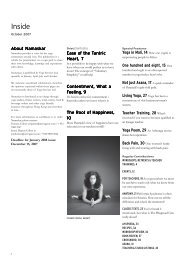You also want an ePaper? Increase the reach of your titles
YUMPU automatically turns print PDFs into web optimized ePapers that Google loves.
Book Review<br />
Dialogue with Death<br />
by Eknath Easwaran<br />
When the gods want to<br />
punish us, they grant us<br />
our desires<br />
Tia, a yoga teacher,<br />
writes from India.<br />
Reviewed by Tia Sinha<br />
We begin to take life seriously when we take<br />
death seriously. Otherwise, as Thoreau said, we<br />
run the risk of discovering, when we come to die,<br />
that we have never lived. Eknath Easwaran<br />
Dialogue with Death is not really a book<br />
on death and dying. It is a book about life<br />
and living: what life is for, who we are as<br />
human beings, why we are here.<br />
Easwaran says the first part of our lives<br />
merely sets the stage for the drama we were<br />
born to play. This is the time for<br />
experimentation, when we play with life’s<br />
toys – money, pleasure, power,<br />
possessions, prestige – and learn for<br />
ourselves what they are worth.<br />
Many never go beyond this phase. Nothing<br />
in modern civilization, with its cult of<br />
youth, encourages us to look further. But it<br />
is only when we throw these toys away and<br />
begin to search for answers to those<br />
essential questions – Who am I? Why am I<br />
here? What is life for? – that we really begin<br />
to live.<br />
For these are the years in which each of us<br />
is meant to grow to our full stature as a<br />
human being. These are the years when<br />
profound personal discoveries and great<br />
contributions are made, which can only<br />
come when a person turns inward. For<br />
those who take up this challenge, life holds<br />
unique promise - the fulfillment of living<br />
for a lofty goal, and of finally discovering<br />
within themselves, a deathless presence.<br />
Dialogue with Death is a commentary on<br />
the Katha Upanishad. It also carries the late<br />
Eknath Easwaran’s translation of the<br />
Katha Upanishad into English.<br />
The dialogue is between a teenager in<br />
ancient India called Nachiketa, and the King<br />
of Death, Yama, whom he approaches to<br />
learn the meaning of life. Nachiketa was a<br />
seeker of tremendous courage, keen<br />
intellect and rare discernment. He could see<br />
right through superficial behavior and the<br />
passing pleasures of this world that<br />
promised satisfaction but only brought<br />
pain. He was willing to go all the way in<br />
search of truth.<br />
to liberation in a way that is easy to relate to<br />
and often humorous. Only by learning to<br />
meditate can we actually get inside the mind<br />
and begin to clean things up. On the other<br />
hand, when we live in a world of<br />
appearances, we think appearance is the<br />
whole of living. Easwaran also touches<br />
upon the pitfalls encountered in<br />
meditation and discusses ingenious ways<br />
to overcome them.<br />
Easwaran points out that we live in a sea<br />
of media conditioning that reflects back to<br />
us what we value, and the false message we<br />
are saturated with is: “You are your body.<br />
The human being is a purely physical<br />
creature whose needs can be satisfied on the<br />
physical level.”<br />
The Katha Upanishad talks of the struggle<br />
between preya (worldly desires stemming<br />
from the false self) and shreya (aspiration to<br />
discover our true divine nature).<br />
Modern civilization believes the purpose of<br />
the body is to enjoy pleasure. The idea<br />
pleasure brings security is a cruel illusion.<br />
The ancient Greeks had a saying: “When<br />
the gods want to punish us, they grant us<br />
our desires.” Where has the religion of<br />
pleasure taken us? Has there ever been a<br />
time in history when it was followed with<br />
greater fervor? Yet there has never been a<br />
time such as now when human beings felt<br />
more alienated, more desolate, more cut<br />
off from those around them. For the same<br />
force that fulfills man’s desires, points out<br />
Easwaran, brings also all the fruits of<br />
selfish craving: loneliness, alienation,<br />
broken relationships, the inability to love.<br />
It is of utmost importance, therefore, that<br />
we have some control over what we desire,<br />
and the key to desire is will.<br />
Real higher education, according to<br />
Easwaran, should develop the higher<br />
mind. It should teach us how to choose,<br />
how to master desires and strengthen the<br />
will, how to protect the mind from<br />
insecurity and the body from stress.<br />
Instead, the young still leave universities<br />
essentially the same as they were when they<br />
arrived – the will no stronger, vision no<br />
clearer and no better idea of how to<br />
transform anger into compassion and<br />
hatred into love.<br />
36<br />
Peppered with examples from modern<br />
living, this book lays down the entire path<br />
Dialogue with Death is eminently readable<br />
and thought provoking.

















